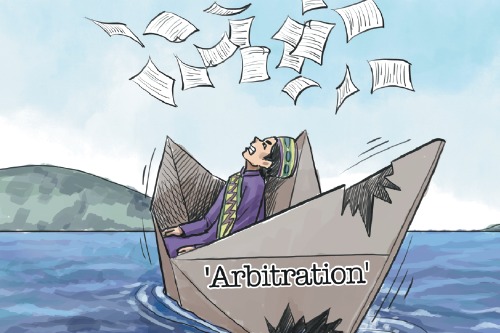South China Sea stability region's priority


The so-called South China Sea arbitration initiated by the Philippines has caused instability and heightened tensions in the region over the past nine years. The Philippines, with the backing of some Western powers such as the United States and the European Union, has been seeking international support to get the ruling implemented, and trying to pressure China into compromising its territorial sovereignty and maritime rights.
But China and key neighboring countries have embraced the concept of a maritime community with a shared future, promoting tangible cooperation in areas such as marine economic integration, ecological protection, and fisheries management. The cooperation has significantly contributed to post-arbitration stability in the South China Sea, and, more importantly, helped maintain peace and stability, and promote shared development in the region.
The relentless focus on the arbitration of the Philippines and some Western countries is misaligned with regional countries' sentiments, and ends up isolating them from the larger regional community.
The so-called South China Sea arbitration was a political spectacle masquerading as a legal case. Initiated unilaterally by the Philippines, it contravened the agreement between Beijing and Manila to resolve disputes through negotiation. From procedure to substance, the arbitration was fraught with illegality, as the tribunal overstepped its authority, disregarding historical facts and international law. The "award" is nothing more than a piece of paper because it's devoid of legitimacy and fairness.
Other countries in the region, too, consider the arbitration to be a farce. Vietnam, Brunei, Malaysia and Indonesia have maintained close ties with China despite the arbitration, advancing bilateral diplomacy to build a community with a shared future. While Vietnam and China continue to engage in dialogue on maritime issues, Malaysia and China have emphasized the importance of peace and stability in the South China Sea, while Brunei and China are focusing on advancing dialogue between China and the Association of Southeast Asian Nations, and China and Indonesia have agreed to deepen maritime cooperation.
The understanding among most countries in the region is that a peaceful and stable South China Sea is essential to regional development, and practical cooperation with China can yield tangible mutual benefits.
The continued emphasis on the arbitration by the Philippines and some Western powers has failed to resolve the issue and, instead, exacerbated regional tensions, undermining trust among countries, with the resulting disruption in regional development provoking resentment among neighboring countries. The region yearns for peace, cooperation and development, not confrontation and conflict which some non-regional players are trying to trigger.
Stability in the South China Sea will facilitate the convergence of regional interests and the aspirations of the people in the region.
Given the above facts, the malicious campaign by the Philippines and certain Western countries is akin to a futile attempt to stop a rolling tide.
Only by abandoning their confrontational mindset, respecting historical facts and international law, and resolving disagreements through dialogue can regional countries maintain true peace and stability in the region, and pursue shared prosperity. More important, China will firmly oppose any efforts to destabilize the South China Sea.
The author is deputy director of the Foreign-Related Rule of Law School at the Law School of Jinan University. The views don't necessarily represent those of China Daily.
If you have a specific expertise, or would like to share your thought about our stories, then send us your writings at opinion@chinadaily.com.cn, and comment@chinadaily.com.cn.


































